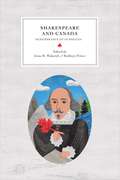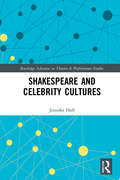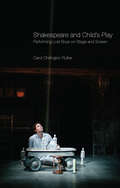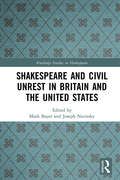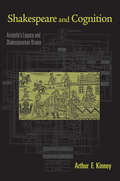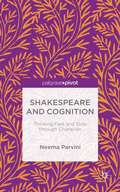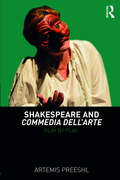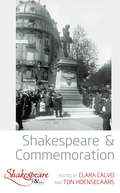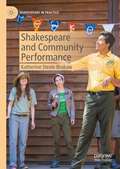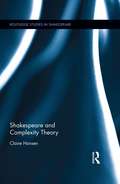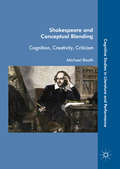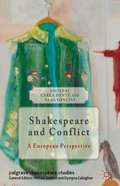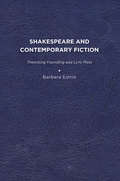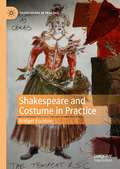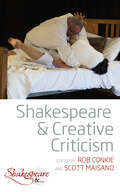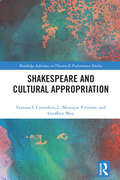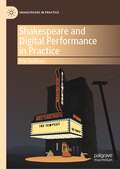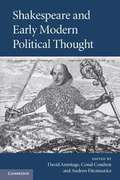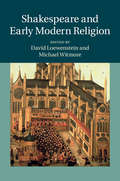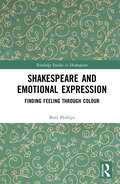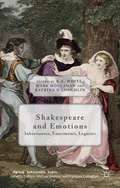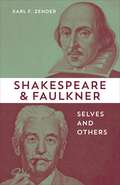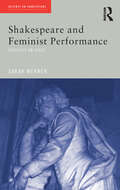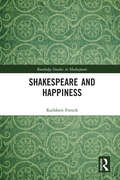- Table View
- List View
Shakespeare and Canada: Remembrance of Ourselves (Reappraisals: Canadian Writers)
by Ian Rae Daniel Fischlin Kailin Wright Annie Brisset Dana Colarusso Don Moore Peter Kuling Richard Cavell Sarah Mackenzie Tom Scholte Troni Grande C. E. McGeeShakespeare in Canada is the result of a collective desire to explore the role that Shakespeare has played in Canada over the past two hundred years, but also to comprehend the way our country’s culture has influenced our interpretation of his literary career and heritage. What function does Shakespeare serve in Canada today? How has he been reconfigured in different ways for particular Canadian contexts? The authors of this book attempt to answer these questions while imagining what the future might hold for William Shakespeare in Canada. Covering the Stratford Festival, the cult CBC television program Slings and Arrows, major Canadian critics such as Northrop Frye and Marshall McLuhan, the influential acting teacher Neil Freiman, the rise of Québécois and First Nation approaches to Shakespeare, and Shakespeare’s place in secondary schools today, this collection reflects the diversity and energy of Shakespeare’s afterlife in Canada. Collectively, the authors suggest that Shakespeare continues to offer Canadians “remembrance of ourselves.” This is a refreshingly original and impressive contribution to Shakespeare studies—a considerable achievement in any work on the history of one of the central figures in the western literary canon.
Shakespeare and Celebrity Cultures (Routledge Advances in Theatre & Performance Studies)
by Jennifer HollThis book argues that Shakespeare and various cultures of celebrity have enjoyed a ceaselessly adaptive, symbiotic relationship since the final decade of the sixteenth century, through which each entity has contributed to the vitality and adaptability of the other. In five chapters, Jennifer Holl explores the early modern culture of theatrical celebrity and its resonances in print and performance, especially in Shakespeare’s interrogations of this emerging phenomenon in sonnets and histories, before moving on to examine the ways that shifting cultures of stage, film, and digital celebrity have perpetually recreated the Shakespeare, or even the #shakespeare, with whom audiences continue to interact. Situated at an intersection of multiple critical conversations, this book will be of great interest to scholars and graduate students of Shakespeare and Shakespearean appropriations, early modern theater, and celebrity studies.
Shakespeare and Child's Play: Performing Lost Boys on Stage and Screen
by Carol Chillington RutterShakespeare wrote more than fifty parts for children, amounting to the first comprehensive portrait of childhood in the English theatre. Focusing mostly on boys, he put sons against fathers, servants against masters, innocence against experience, testing the notion of masculinity, manners, morals, and the limits of patriarchal power. He explored the nature of relationships and ideas about parenting in terms of nature and nurture, permissiveness and discipline, innocence and evil. He wrote about education, adolescent rebellion, delinquency, fostering, and child-killing, as well as the idea of the redemptive child who ‘cures’ diseased adult imaginations. ‘Childness’ – the essential nature of being a child – remains a vital critical issue for us today. In Shakespeare and Child’s-Play Carol Rutter shows how recent performances on stage and film have used the range of Shakespeare’s insights in order to re-examine and re-think these issues in terms of today’s society and culture.
Shakespeare and Civil Unrest in Britain and the United States (Routledge Studies in Shakespeare)
by Mark BayerShakespeare and Civil Unrest in Britain and the United States extends the growing body of scholarship on Shakespeare’s appropriation by examining how the plays have been invoked during periods of extreme social, political, and racial turmoil. How do the ways that Shakespeare is adapted, studied, and discussed during periods of civil conflict differ from wars between nations? And how have these conflicts, in turn, affected how Shakespeare has been understood in these two countries that, more than any others, continue to be deeply shaped by Shakespeare’s complex, enduring, and multivalent legacy? The essays in this volume collectively disclose a fascinating genealogy of how Shakespeare became a dynamic presence in factional discourse and explore the "war of words" that has accompanied civil wars and other instances of domestic disturbance. Whether as part of violent confrontations, mutinies, rebellions, or within the universal struggle for civil rights, Shakespeare’s repeated appearance during such turbulent moments is more than mere historical coincidence. Rather, its inflections on the contested meanings of citizenship, community, and political legitimacy demonstrate the generative influence of the plays on our understanding of internecine strife in both countries.
Shakespeare and Cognition: Aristotle's Legacy and Shakespearean Drama
by Arthur F. KinneyShakespeare and Cognition examines the essential relationship between vision, knowledge, and memory in Renaissance models of cognition as seen in Shakespeare's plays. Drawing on both Aristotle's Metaphysics and contemporary cognitive literary theory, Arthur F. Kinney explores five key objects/images in Shakespeare's plays – crowns, bells, rings, graves and ghosts – that are not actually seen (or, in the case of the latter, not meant to be seen), but are central to the imagination of both the playwright and the playgoers.
Shakespeare and Cognition: Thinking Fast and Slow through Character
by Neema ParviniShakespeare and Cognition.
Shakespeare and Commedia dell'Arte: Play by Play
by Artemis PreeshlShakespeare and Commedia dell’Arte examines the ongoing influence of commedia dell’arte on Shakespeare’s plays. Exploring the influence of commedia dell’arte improvisation, sight gags, and wordplay on the development of Shakespeare’s plays, Artemis Preeshl blends historical research with extensive practical experience to demonstrate how these techniques might be applied when producing some of Shakespeare's best-known works today. Each chapter focuses on a specific play, from A Midsummer Night’s Dream to The Winter’s Tale, drawing out elements of commedia dell’arte style in the playscripts and in contemporary performance. Including contemporary directors’ notes and interviews with actors and audience members alongside Elizabethan reviews, criticism, and commentary, Shakespeare and Commedia dell’Arte presents an invaluable resource for scholars and students of Renaissance theatre.
Shakespeare and Commemoration: Commemoration And Cultural Memory (Shakespeare & #2)
by Ton Hoenselaars Clara CalvoMemory and commemoration play a vital role not only in the work of Shakespeare, but also in the process that has made him a world author. As the contributors of this collection demonstrate, the phenomenon of commemoration has no single approach, as it occurs on many levels, has a long history, and is highly unpredictable in its manifestations. With an international focus and a comparative scope that explores the afterlives also of other artists, this volume shows the diverse modes of commemorative practices involving Shakespeare. Delving into these “cultures of commemoration,” it presents keen insights into the dynamics of authorship, literary fame, and afterlives in its broader socio-historical contexts.
Shakespeare and Community Performance (Shakespeare in Practice)
by Katherine Steele BrokawThis book explores how productions of Shakespearean plays create meaning in specific communities, with special attention to issues of access, adaptation, and activism. Instead of focusing on large professional companies, it analyzes performances put on by community theatres and grassroots companies, and in applied drama projects. It looks at Shakespearean productions created by marginalized populations in Greater London, Harlem, and Los Angeles, a Hamlet staged in the remote Faroe Islands, and eco-theatre made in California’s Yosemite National Park. The book investigates why different communities perform Shakespeare, and what challenges, opportunities, and triumphs accompany the processes of theatrical production for both the artists and the communities in which they are embedded.
Shakespeare and Complexity Theory (Routledge Studies in Shakespeare)
by Claire HansenIn this new monograph, Claire Hansen demonstrates how Shakespeare can be understood as a complex system, and how complexity theory can provide compelling and original readings of Shakespeare’s plays. The book utilises complexity theory to illuminate early modern theatrical practice, Shakespeare pedagogy, and the phenomenon of the Shakespeare ‘myth’. The monograph re-evaluates Shakespeare, his plays, early modern theatre, and modern classrooms as complex systems, illustrating how the lens of complexity offers an enlightening new perspective on diverse areas of Shakespeare scholarship. The book’s interdisciplinary approach enriches our understanding of Shakespeare and lays the foundation for complexity theory in Shakespeare studies and the humanities more broadly.
Shakespeare and Conceptual Blending
by Michael BoothThis book shows how Shakespeare's excellence as storyteller, wit and poet reflects the creative process of conceptual blending. Cognitive theory provides a wealth of new ideas that illuminate Shakespeare, even as he illuminates them, and the theory of blending, or conceptual integration, strikingly corroborates and amplifies both classic and current insights of literary criticism. This study explores how Shakespeare crafted his plots by fusing diverse story elements and compressing incidents to strengthen dramatic illusion; considers Shakespeare's wit as involving sudden incongruities and a reckoning among differing points of view; interrogates how blending generates the "strange meaning" that distinguishes poetic expression; and situates the project in relation to other cognitive literary criticism. This book is of particular significance to scholars and students of Shakespeare and cognitive theory, as well as readers curious about how the mind works.
Shakespeare and Conflict
by Carla Dente Sara SonciniWhat has been the role played by principles, patterns and situations of conflict in the construction of Shakespeare's myth, and in its European and then global spread? The fascinatingly complex picture that emerges from this collection provides new insight into Shakespeare's unique position in world literature and culture.
Shakespeare and Contemporary Fiction: Theorizing Foundling and Lyric Plots
by Barbara L. EstrinIn the first book to use fiction as theory, Barbara L. Estrin reverses chronological direction, beginning with contemporary novels to arrive at a re-visioned Shakespeare, uncovering a telling difference in the stories that script us and that influence our political unconscious in ways that have never been explored in literary-critical interpretations. Describing the animus against foreign blood, central to the dynamic of the foundling and lyric plots that form the nexus of her study, Estrin describes how late modern writers change those plots. Reading backward through the theoretical lens of their revisions allows us to rethink the Shakespeare we thought we knew. That innovative methodology, in turn, encourages us to read forward again with different tellings, ones that challenge the mythological homogeneity of the traditional classifications and that suggest new formulaic paradigms. With close readings of four contemporary novels and three Shakespeare plays, Estrin identifies the cultural walls that contribute to political gate-keeping as she chronicles the connection between plot variations and gender revisionism in the work of Caryl Phillips, Liz Jensen, Anne Michaels, and W.G. Sebald, as well as two film-makers (Mona Hatoum and Mieke Bal) who demonstrate an understanding that mythical repercussions prove dangerous in the twentieth and twenty-first centuries even as they suggest how the heritage shaping their work, and to which they are themselves drawn, in turn proposes an alternative Shakespeare, one who frees us to ask other questions: At the time that the nation state was beginning to coalesce, what does Shakespeare’s frequent use of the foundling plot and his significant variations portend? How does his infusion of a revised lyric dynamic in The Merchant of Venice, Othello and The Winter’s Tale change our reading of plays where the two plots coalesce as they do in the contemporary novels that shape Estrin’s late modern interpretations? All the works in this study share the underlying premise that the connection between cultural origins and political destinies is reciprocal and that it is necessary and possible to transform the constructs—in memory and imagination—that continue to shape our lives. Published by University of Delaware Press. Distributed worldwide by Rutgers University Press.
Shakespeare and Costume in Practice (Shakespeare in Practice)
by Bridget EscolmeWhat is the role of costume in Shakespeare production? Shakespeare and Costume in Practice argues that costume design choices are central not only to the creation of period setting and the actor’s work on character, but to the cultural, political, and psychological meanings that the theatre makes of Shakespeare. The book explores questions about what the first Hamlet looked like in his mourning cloak; how costumes for a Shakespeare comedy can reflect or critique the collective nostalgias a culture has for its past; how costume and casting work together to ask new questions about Shakespeare and race. Using production case studies of Hamlet, Much Ado About Nothing, and The Tempest, the book demonstrates that costume design can be a site of experimentation, playfulness, and transgression in the theatre – and that it can provoke audiences to think again about what power, race, and gender look like on the Shakespearean stage.
Shakespeare and Creative Criticism (Shakespeare & #4)
by Scott Maisano Rob ConkieWhat kinds of critical insights are made possible only or especially via creative strategies? This volume examines how creative modes of writing might facilitate or inform new ways to critically engage with Shakespeare. Creative writing, demonstrated in a series of essays, reflections, stories and scenes, operates as a vehicle for exploring and articulating critical and theoretical ideas. In doing so, Shakespeare’s enduring creative and critical appeal is newly understood and critiqued.
Shakespeare and Cultural Appropriation (Routledge Advances in Theatre & Performance Studies)
by L. Monique Pittman Vanessa I. Corredera Geoffrey WayShakespeare and Cultural Appropriation pushes back against two intertwined binaries: the idea that appropriation can only be either theft or gift, and the idea that cultural appropriation should be narrowly defined as an appropriative contest between a hegemonic and marginalized power. In doing so, the contributions to the collection provide tools for thinking about appropriation and cultural appropriation as spectrums constantly evolving and renegotiating between the poles of exploitation and appreciation. This collection argues that the concept of cultural appropriation is one of the most undertheorized yet evocative frameworks for Shakespeare appropriation studies to address the relationships between power, users, and uses of Shakespeare. By robustly theorizing cultural appropriation, this collection offers a foundation for interrogating not just the line between exploitation and appreciation, but also how distinct values, biases, and inequities determine where that line lies. Ultimately, this collection broadly employs cultural appropriation to rethink how Shakespeare studies can redirect attention back to power structures, cultural ownership and identity, and Shakespeare’s imbrication within those networks of power and influence. Throughout the contributions in this collection, which explore twentieth and twenty-first century global appropriations of Shakespeare across modes and genres, the collection uncovers how a deeper exploration of cultural appropriation can reorient the inquiries of Shakespeare adaptation and appropriation studies. This collection will be of great interest to students and scholars in theatre and performance studies, Shakespeare studies, and adaption studies.
Shakespeare and Digital Performance in Practice (Shakespeare in Practice)
by Erin SullivanShakespeare and Digital Performance in Practice explores the impact of digital technologies on the theatrical performance of Shakespeare in the twenty-first century, both in terms of widening cultural access and developing new forms of artistry. Through close analysis of dozens of productions, both high-profile and lesser known, it examines the rise of live broadcasting and recording in the theatre, the growing use of live video feeds and dynamic projections on the mainstream stage, and experiments in born-digital theatre-making, including social media, virtual reality, and video-conferencing adaptations. In doing so, it argues that technologically adventurous performances of Shakespeare allow performers and audiences to test what they believe theatre to be, as well as to reflect on what it means to be present—with a work of art, with others, with oneself—in an increasingly online world.
Shakespeare and Early Modern Political Thought
by David Armitage Conal Condren Andrew FitzmauriceThis is the first collaborative volume to place Shakespeare's works within the landscape of early modern political thought. Until recently, literary scholars have not generally treated Shakespeare as a participant in the political thought of his time, unlike his contemporaries Ben Jonson, Edmund Spenser and Philip Sidney. At the same time, historians of political thought have rarely turned their attention to major works of poetry and drama. A distinguished international and interdisciplinary team of contributors examines the full range of Shakespeare's writings in order to challenge conventional interpretations of plays central to the canon, such as Hamlet; open up novel perspectives on works rarely considered to be political, such as the Sonnets; and focus on those that have been largely neglected, such as The Merry Wives of Windsor. The result is a coherent and challenging portrait of Shakespeare's distinctive engagement with the characteristic questions of early modern political thought.
Shakespeare and Early Modern Religion
by David Loewenstein Michael WitmoreWritten by an international team of literary scholars and historians, this collaborative volume illuminates the diversity of early modern religious beliefs and practices in Shakespeare's England, and considers how religious culture is imaginatively reanimated in Shakespeare's plays. Fourteen new essays explore the creative ways Shakespeare engaged with the multifaceted dimensions of Protestantism, Catholicism, non-Christian religions including Judaism and Islam, and secular perspectives, considering plays such as Hamlet, Julius Caesar, King John, King Lear, Macbeth, Measure for Measure, A Midsummer Night's Dream and The Winter's Tale. The collection is of great interest to readers of Shakespeare studies, early modern literature, religious studies, and early modern history.
Shakespeare and Emotional Expression: Finding Feeling through Colour (Routledge Studies in Shakespeare)
by Bríd PhillipsShakespeare and Emotional Expression offers an exciting new way of considering emotional transactions in Shakespearean drama. The book is significant in its scope and originality as it uses the innovative medium of colour terms and references to interrogate the early modern emotional register. By examining contextual and cultural influences, this work explores the impact these influences have on the relationship between colour and emotion and argues for the importance of considering chromatic references as a means to uncover emotional significances. Using a broad range of documents, it offers a wider understanding of affective expression in the early modern period through a detailed examination of several dramatic works. Although colour meanings fluctuate, by paying particular attention to contextual clues and the historically specific cultural situations of Shakespeare’s plays, this book uncovers emotional significances that are not always apparent to modern audiences and readers. Through its examination of the nexus between the history of emotions and the social and cultural uses of colour in early modern drama, Shakespeare and Emotional Expression adds to our understanding of the expressive and affective possibilities in Shakespearean drama.
Shakespeare and Emotions
by Katrina O’loughlin R. S. White Mark HoulahanThis collection of original essays by established and emerging scholars approaches the works of Shakespeare from the topical perspective of the History of Emotions. What emerges is not a single paradigm or 'grand narrative', but a variety of approaches, ranging from the historical to the interpretive, illuminating the primacy of emotions in Shakespearean scholarship and theatre. The section 'Emotional Inheritances' looks back to Shakespeare's sources and cultural backgrounds, showing that some aspects of his representations of emotions come from the classics and medieval world; 'Shakespearean Enactments' presents essays that analyse a range of emotional states and issues in the plays themselves; while 'Legacies and Re-Enactments' traces aspects of his influence through later times and down to the present day. Taken together these diverse but related essays present a kaleidoscope of suggestive approaches to the potentially endless subject of emotions in Shakespeare.
Shakespeare and Faulkner: Selves and Others
by Karl F. ZenderShakespeare and Faulkner explores the moral and ethical dilemmas that characters face inside themselves and in their interactions with others in the works of these two famed authors. Karl F. Zender’s characterological study offers insightful, critically rigorous, and at times quite personal analyses of the complicated figures who inhabit several major Shakespeare plays and Faulkner novels. The two parts of this book—the first of which focuses on the English playwright, the second on the Mississippi novelist—share a common methodology in that they originate in Zender’s history as a teacher of and writer on the two authors, who until now he generally approached separately. He emphasizes the evolving insights gleaned from reading these authors over several decades, situating their texts in relation to shifting trends in criticism and highlighting the contemporary relevance of their works. The final chapter, an extended discussion of Faulkner’s Intruder in the Dust, attempts something unusual in Zender’s critical practice: It relies less on the close textual analysis that characterizes his previous work and instead explores the intersections between events depicted in the novel and his own life, both as a child and as an adult. Shakespeare and Faulkner speaks to the power of literature as a form of pleasure and of solace. With this work of engaged and thoughtful scholarly criticism, Zender reveals the centrality of storytelling to human beings’ efforts to make sense both of their journey through life and of the circumstances in which they live.
Shakespeare and Feminist Performance: Ideology on Stage (Accents on Shakespeare)
by Sarah WernerHow do performances of Shakespeare change the meanings of the plays? In this controversial new book, Sarah Werner argues that the text of a Shakespeare play is only one of the many factors that give a performance its meaning. By focusing on The Royal Shakespeare Company, Werner demonstrates how actor training, company management and gender politics fundamentally affect both how a production is created and the interpretations it can suggest. Werner concentrates particularly on: The influential training methods of Cicely Berry and Patsy Rodenburg The history of the RSC Women's Group Gale Edwards' production of The Taming of the Shrew She reveals that no performance of Shakespeare is able to bring the plays to life or to realise the playwright's intentions without shaping them to mirror our own assumptions. By examining the ideological implications of performance practices, this book will help all interested in Shakespeare's plays to explore what it means to study them in performance.
Shakespeare and Genre
by Anthony R. GuneratneProvides a comprehensive survey of approaches to genre in Shakespeare's work. Contributors probe deeply into genre theory and genre history by relating Renaissance conceptions. In this sense, the volume proposes to read Shakespeare through genre and, just as importantly, read genre through Shakespeare.
Shakespeare and Happiness (Routledge Studies in Shakespeare)
by Kathleen FrenchShakespeare and Happiness is a study of attitudes to happiness in the early modern period and in Shakespeare’s plays. It considers the conflicting influences of religion and Aristotelian philosophy in shaping attitudes to the possibility of attaining happiness. By being the first book to focus specifically on the representation of happiness in Shakespeare’s plays, it contributes to feminist approaches to Shakespeare by foregrounding the important role of women in showing the right way to live and achieve happiness. timely criticism, as it considers Shakespeare in the current context of the #MeToo movement providing new insights to studies of the emotions by approaching them from the perspective of research conducted by positive psychologists. This book takes an interdisciplinary approach that combines methodologies from literature, psychology philosophy, religion and history, by emphasizing the richness and complexity of Shakespeare’s exploration of the nature of happiness.
